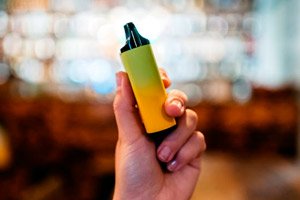
All iLive content is medically reviewed or fact checked to ensure as much factual accuracy as possible.
We have strict sourcing guidelines and only link to reputable media sites, academic research institutions and, whenever possible, medically peer reviewed studies. Note that the numbers in parentheses ([1], [2], etc.) are clickable links to these studies.
If you feel that any of our content is inaccurate, out-of-date, or otherwise questionable, please select it and press Ctrl + Enter.
Parents' vaping can cause eczema in children
Last reviewed: 02.07.2025
 ">
">Parents who use e-cigarettes at home may be putting their children at risk of developing eczema, a new study suggests.
A study that used data from more than 35,000 U.S. households found that children with a parent who used e-cigarettes were 24% more likely to develop eczema (also known as atopic dermatitis) compared to children whose parents did not use e-cigarettes.
"Our results indicate that parental e-cigarette use is associated with the development of atopic dermatitis in children," concluded the team, led by Dr. Golyara Honari, clinical assistant professor of dermatology at Stanford University in California.
Their results were published in the journal JAMA Dermatology.
There is a scientific basis for suggesting that exposure to toxins released from e-cigarette vapor may cause changes in children's skin, researchers say.
Previous laboratory studies have shown "increased oxidative stress in human keratinocytes and 3D skin models exposed to e-cigarette liquids and aerosol residues," they noted. Keratinocytes make up about 90 percent of the outer epidermal layer of the skin.
"We hypothesize that secondary exposure to e-cigarettes is associated with a similar response in children, increasing the risk of atopic dermatitis," the Stanford team wrote.
The new study was based on data from the 2014-2018 National Community Health Interview Survey, a personal survey of families conducted by the U.S. Centers for Disease Control and Prevention that included nearly 35,000 households.
Parents were asked about their children's history of eczema and the use of e-cigarettes in the home.
Overall, about 13% of children in the survey had a history of eczema, which is in line with typical estimates.
However, children exposed to their parents' e-cigarettes were 24% more likely to develop eczema than those not exposed, Honari's team found. This was true even if the parent also smoked traditional cigarettes at home.
The Stanford team stressed that the study was not designed to prove cause and effect.
However, this preliminary analysis of the impact of vaping on children's skin health was necessary "given the exponentially increasing prevalence of e-cigarette use and its understudied association with the health of immediate family members," Honari and colleagues noted.
